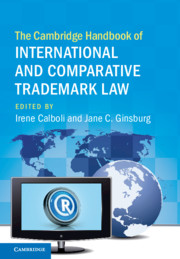Book contents
- The Cambridge Handbook of International and Comparative Trademark Law
- The Cambridge Handbook of International and Comparative Trademark Law
- Copyright page
- Contents
- Editors and Contributors
- Foreword
- Preface
- Part One International Aspects of Trademark Protection
- Part Two Comparative Perspectives on Trademark Protection
- I The Nature and Functions of Trademarks
- II Signs That Can Be Protected as Trademarks
- III Public Policy Limitations of Trademark Subject Matter
- IV The Relationship between Trademarks and Geographical Indications
- V Certification and Collective Marks
- VI The Relationship between Trademark Law and Advertising Law
- VII The Relationship between Trademark Law and the Right of Publicity
- VIII Trademarks and Domain Names
- IX Overlapping Rights
- X Theories Underlying the Standards for Trademark Infringement
- XI Trademark Dilution
- XII Secondary Trademark Liability
- XIII Trademark Defenses
- XIV The Principle of Exhaustion of Trademark Rights
- XV Trademark Transactions
- 37 Trademark Transactions in Common Law Countries
- 38 Civil Law Perspectives on Trademark Transactions
- Index
37 - Trademark Transactions in Common Law Countries
Liberalisation and Its Limits
from XV - Trademark Transactions
Published online by Cambridge University Press: 18 September 2020
- The Cambridge Handbook of International and Comparative Trademark Law
- The Cambridge Handbook of International and Comparative Trademark Law
- Copyright page
- Contents
- Editors and Contributors
- Foreword
- Preface
- Part One International Aspects of Trademark Protection
- Part Two Comparative Perspectives on Trademark Protection
- I The Nature and Functions of Trademarks
- II Signs That Can Be Protected as Trademarks
- III Public Policy Limitations of Trademark Subject Matter
- IV The Relationship between Trademarks and Geographical Indications
- V Certification and Collective Marks
- VI The Relationship between Trademark Law and Advertising Law
- VII The Relationship between Trademark Law and the Right of Publicity
- VIII Trademarks and Domain Names
- IX Overlapping Rights
- X Theories Underlying the Standards for Trademark Infringement
- XI Trademark Dilution
- XII Secondary Trademark Liability
- XIII Trademark Defenses
- XIV The Principle of Exhaustion of Trademark Rights
- XV Trademark Transactions
- 37 Trademark Transactions in Common Law Countries
- 38 Civil Law Perspectives on Trademark Transactions
- Index
Summary
Historically, common law countries took a restrictive approach to transactions involving trademarks. This restrictive approach was said to flow from the reasons for granting protection for trademarks in the first place. If a trademark communicates information to consumers as to the origin and quality of a particular trader’s goods or services, it was thought that any dealing with a trademark, such as an assignment or the grant of a licence to a third party, would disrupt the source and quality guarantee functions of the mark and potentially cause confusion among consumers. In other words, the very reasons that a trademark receives legal protection were thought to justify constraining an owner’s ability to deal with the mark (in contrast with other personal property, such as an unencumbered chattel or a patent). Initially, these sorts of concerns were highly influential, and the law either proscribed or imposed strict limitations on the exploitation of trademarks. However, over the course of the last century there was a gradual liberalisation of these rules. Consequently, in most common law countries, we have now reached a position where the law recognises registered trademarks to be personal property, which can be exploited with fewer restrictions than in the past. This liberalisation has to a large extent reflected changes in business practices, as brands have come to be recognised as valuable commodities in their own right and as trademark licensing, merchandising and franchising have become large and lucrative industries. Notwithstanding this, the tension between the idea of the mark as “property” and the mark as a badge of origin remains. This tension is reflected in the fact that the law retains restrictions on trademark transactions in cases where marks have been or might be used in such a way as to deceive consumers. Working out when a badge of origin can be transferred to an unrelated third party whilst not falling into the category of a “deceptive transaction” remains difficult.
- Type
- Chapter
- Information
- Publisher: Cambridge University PressPrint publication year: 2020



